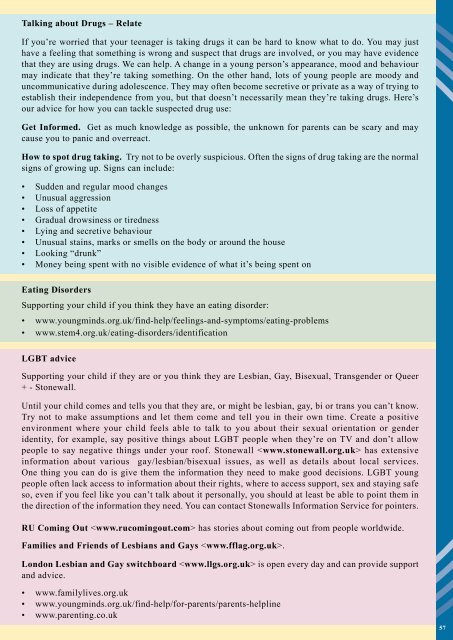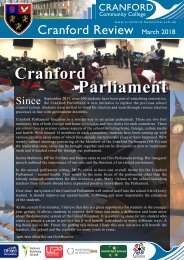Cranford Review 2018
The “Cranford Review” © is a publication of Cranford Community College. Is an annual high standard produced magazine which provides an archive document highlighting various aspects of the life of the academy, its staff, students and community from each academic year. It is a wonderful read and a useful historical document which, with its termly sister publications and occasional special editions, also serves to describe the values of the academy and support the aspirations of the academy, its staff, students and wider community. A colorful layout with a wide range of topics comprising events, extracurricular activities, recognition awards, initiatives, trips and excursions among many others. Hard copies are provided to stakeholders including families, staff, partners, visitors, prospective parents/students, prospective employees and others with an interest or stake in the academy and its students. Headteacher & Director: Kevin Prunty / Editor-in-chief: Jessica Joyce / Graphic Design: Enzo Gianvittorio Danese (Enzo GD) / Printed by: Springfieldpapers.com
The “Cranford Review” © is a publication of Cranford Community College. Is an annual high standard produced magazine which provides an archive document highlighting various aspects of the life of the academy, its staff, students and community from each academic year.
It is a wonderful read and a useful historical document which, with its termly sister publications and occasional special editions, also serves to describe the values of the academy and support the aspirations of the academy, its staff, students and wider community. A colorful layout with a wide range of topics comprising events, extracurricular activities, recognition awards, initiatives, trips and excursions among many others. Hard copies are provided to stakeholders including families, staff, partners, visitors, prospective parents/students, prospective employees and others with an interest or stake in the academy and its students.
Headteacher & Director: Kevin Prunty / Editor-in-chief: Jessica Joyce / Graphic Design: Enzo Gianvittorio Danese (Enzo GD) / Printed by: Springfieldpapers.com
Create successful ePaper yourself
Turn your PDF publications into a flip-book with our unique Google optimized e-Paper software.
Talking about Drugs – Relate<br />
If you’re worried that your teenager is taking drugs it can be hard to know what to do. You may just<br />
have a feeling that something is wrong and suspect that drugs are involved, or you may have evidence<br />
that they are using drugs. We can help. A change in a young person’s appearance, mood and behaviour<br />
may indicate that they’re taking something. On the other hand, lots of young people are moody and<br />
uncommunicative during adolescence. They may often become secretive or private as a way of trying to<br />
establish their independence from you, but that doesn’t necessarily mean they’re taking drugs. Here’s<br />
our advice for how you can tackle suspected drug use:<br />
Get Informed. Get as much knowledge as possible, the unknown for parents can be scary and may<br />
cause you to panic and overreact.<br />
How to spot drug taking. Try not to be overly suspicious. Often the signs of drug taking are the normal<br />
signs of growing up. Signs can include:<br />
• Sudden and regular mood changes<br />
• Unusual aggression<br />
• Loss of appetite<br />
• Gradual drowsiness or tiredness<br />
• Lying and secretive behaviour<br />
• Unusual stains, marks or smells on the body or around the house<br />
• Looking “drunk”<br />
• Money being spent with no visible evidence of what it’s being spent on<br />
Eating Disorders<br />
Supporting your child if you think they have an eating disorder:<br />
• www.youngminds.org.uk/find-help/feelings-and-symptoms/eating-problems<br />
• www.stem4.org.uk/eating-disorders/identification<br />
LGBT advice<br />
Supporting your child if they are or you think they are Lesbian, Gay, Bisexual, Transgender or Queer<br />
+ - Stonewall.<br />
Until your child comes and tells you that they are, or might be lesbian, gay, bi or trans you can’t know.<br />
Try not to make assumptions and let them come and tell you in their own time. Create a positive<br />
environment where your child feels able to talk to you about their sexual orientation or gender<br />
identity, for example, say positive things about LGBT people when they’re on TV and don’t allow<br />
people to say negative things under your roof. Stonewall has extensive<br />
information about various gay/lesbian/bisexual issues, as well as details about local services.<br />
One thing you can do is give them the information they need to make good decisions. LGBT young<br />
people often lack access to information about their rights, where to access support, sex and staying safe<br />
so, even if you feel like you can’t talk about it personally, you should at least be able to point them in<br />
the direction of the information they need. You can contact Stonewalls Information Service for pointers.<br />
RU Coming Out has stories about coming out from people worldwide.<br />
Families and Friends of Lesbians and Gays .<br />
London Lesbian and Gay switchboard is open every day and can provide support<br />
and advice.<br />
• www.familylives.org.uk<br />
• www.youngminds.org.uk/find-help/for-parents/parents-helpline<br />
• www.parenting.co.uk<br />
57

















